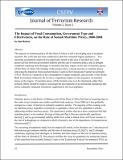Files in this item
The impact of food consumption, government type and effectiveness, on the rate of Somali maritime piracy, 2000-2008
Item metadata
| dc.contributor.author | Rohrer, Sam | |
| dc.date.accessioned | 2013-08-30T14:50:25Z | |
| dc.date.available | 2013-08-30T14:50:25Z | |
| dc.date.issued | 2011-10-30 | |
| dc.identifier.citation | Rohrer, S. (2011). The impact of food consumption, government type and effectiveness, on the rate of Somali maritime piracy, 2000-2008. Journal of Terrorism Research, 2(2), pp. 27-41. | en_US |
| dc.identifier.issn | 2049-7040 | en_US |
| dc.identifier.uri | http://ojs.st-andrews.ac.uk/index.php/jtr/article/view/189 | en_US |
| dc.identifier.uri | https://hdl.handle.net/10023/4027 | |
| dc.description.abstract | The analysis of maritime piracy off the Horn of Africa is still a developing area of academic research. The work that has been conducted to date has remained largely qualitative. Two recurring assumptions made but not empirically tested in this area of research are 1) the perceived link between government stability and the rate of maritime piracy, and 2) drought conditions implying food shortages in Somalia, and their impact on the rate of maritime piracy off the Horn of Africa. The findings of this project show a strong increase in maritime piracy following the transition from assorted Islamic Courts to the Transitional Federal Government (TFG). However, variations in the consumption of staple foodstuffs, and an index of the World Bank Governance Indicators do not have a significant impact on the frequency of maritime piracy in the region. If maritime piracy off the Somali coast is to be eliminated, rather than policed, efforts should be made to encourage the development of governmental institutions that utilize culturally-respected institutions supported by the local populace. | en_US |
| dc.language.iso | en | en_US |
| dc.publisher | Centre for the Study of Terrorism and Political Violence, University of St Andrews | en_US |
| dc.relation.ispartof | Journal of Terrorism Research | en_US |
| dc.rights | This is an open access article published in Journal of Terrorism Research. This work is licensed under a Creative Commons Attribution 3.0 License (http://creativecommons.org/licenses/by/3.0/) | en_US |
| dc.rights.uri | http://creativecommons.org/licenses/by/3.0/ | |
| dc.subject | Somalia | en_US |
| dc.subject | Piracy | en_US |
| dc.subject | Food | en_US |
| dc.subject.lcc | HV6431 | en_US |
| dc.subject.lcsh | Terrorism | en_US |
| dc.title | The impact of food consumption, government type and effectiveness, on the rate of Somali maritime piracy, 2000-2008 | en_US |
| dc.type | Journal article | en_US |
| dc.description.version | https://doi.org/Publisher PDF | en_US |
| dc.publicationstatus | Published | en_US |
| dc.status | Peer reviewed | en_US |
| dc.identifier.doi | https://doi.org/http://doi.org/10.15664/jtr.189 | en |
This item appears in the following Collection(s)
Except where otherwise noted within the work, this item's licence for re-use is described as This is an open access article published in Journal of Terrorism Research. This work is licensed under a Creative Commons Attribution 3.0 License (http://creativecommons.org/licenses/by/3.0/)
Items in the St Andrews Research Repository are protected by copyright, with all rights reserved, unless otherwise indicated.


